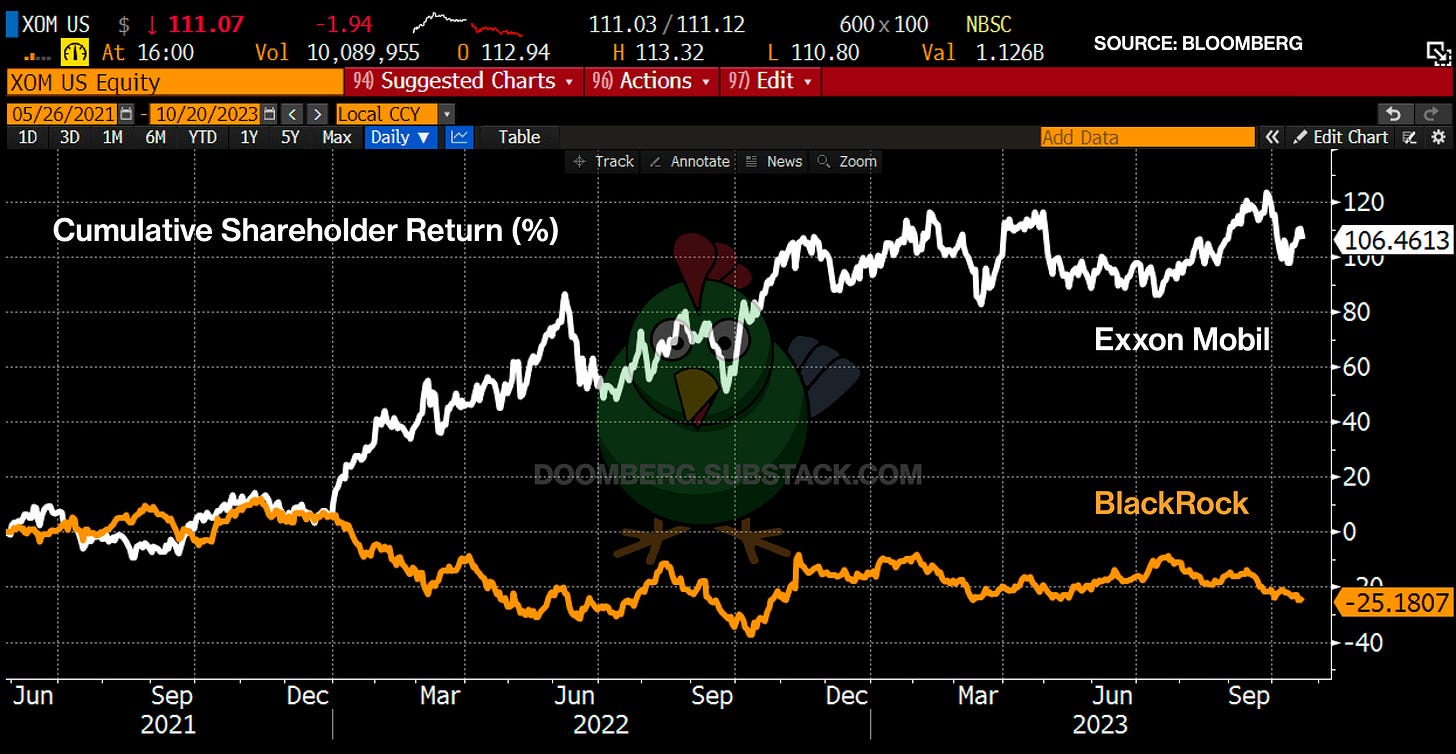Power Play
In a world convinced it will soon move beyond fossil fuels, Exxon Mobil is taking the under.
“For a successful technology, reality must take precedence over public relations, for Nature cannot be fooled.” – Richard Feynman
In the middle of 2021, things were not looking so great for Darren Woods, Exxon Mobil’s CEO and board chair. As an Exxon lifer, Woods spent three decades climbing the ladder in a culture known to be particularly difficult for outsiders to penetrate. And now on his watch, Exxon was facing an unexpected assault from above. The rise of passive investing concentrated ownership of Exxon’s stock into the hands of big money aggregators like BlackRock and Vanguard, and the CEOs of those companies were being pressured by environmentalists to use their newfound financial leverage to force change upon the fossil fuel industry.
When the largest oil company in the US held its annual meeting on May 26, 2021, it came under direct assault on the matter. We turn to the New York Times for the stunning details (emphasis added throughout):
“Last week, an activist investor successfully waged a battle to install three directors on the board of Exxon with the goal of pushing the energy giant to reduce its carbon footprint. The investor, a hedge fund called Engine No. 1, was virtually unknown before the fight.
The tiny firm wouldn’t have had a chance were it not for an unusual twist: the support of some of Exxon’s biggest institutional investors. BlackRock, Vanguard and State Street voted against Exxon’s leadership and gave Engine No. 1 powerful support. These huge investment companies rarely side with activists on such issues.
The stunning result turned the sleepy world of boardroom elections into front-page news as climate activists declared a major triumph, and a blindsided Exxon was left to ponder its defeat.”
At the time, BlackRock’s Larry Fink was particularly eager to show his green bonafides. The 2021 edition of his annual letter to CEOs mentions the word “climate” an incredible 27 times, testimony to the seriousness with which the one-time real estate major was treating the issue. In conjunction with the activist war over Exxon’s board, Fink published a 9-page report via BlackRock Investment Stewardship (BIS) flexing the muscle he put behind Engine No. 1’s move:
“We continue to be concerned about Exxon’s strategic direction and the anticipated impact on its long-term financial performance and competitiveness. In our view, the Board would benefit from the addition of diverse energy experience to augment existing skillsets. As a result, BIS supported three of the four directors nominated by Engine No. 1….
We believe that our support of the majority of the directors nominated by Engine No. 1, sends a clear signal to the company about our expectations that the Board demonstrate greater independence and fresh thinking.”
What a difference two short years can make.
Fink has now entered the “find out” phase of political activism, experiencing serious blowback from many of his conservative paymasters. The energy crisis in Europe—still in its infancy when Exxon suffered its setback at the board—matured into a global economic emergency of historic proportions. And, undoubtedly emboldened by his assessment of the West’s many strategic energy weaknesses, Putin made his move on Ukraine. These events reminded leaders of all stripes that energy is the ultimate master resource.
Not that Woods needed reminding.
While many unserious political thinkers and environmental activists keep telling themselves the world can kick its reliance on fossil fuels within a period measured in years, Exxon’s actions since that fateful shareholder meeting amount to a contrarian “bet-the-franchise” wager otherwise. Woods has managed to keep the company on strategy, a feat codified this year in a historic series of shrewd moves that should position the company for decades of value creation. In contrast, BlackRock’s leader has fought a rearguard action, often lamenting that he finds himself in an impossible position, as though his actions had nothing to do with putting him there. The cumulative total return of BlackRock and Exxon over the intervening 29 months is the ultimate measure of CEO performance, and the market has spoken decisively:
How did Woods maneuver Exxon through the ESG political storm? What were his major moves and will they pay off? Let’s head to Houston and find out.



